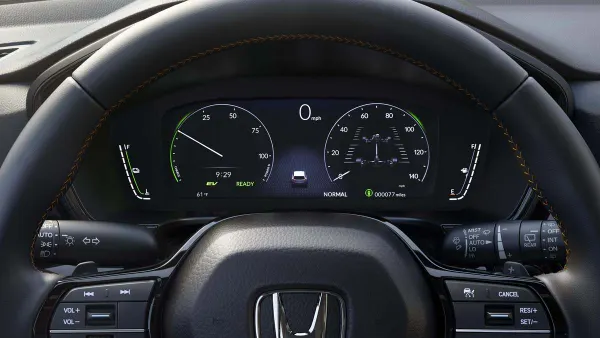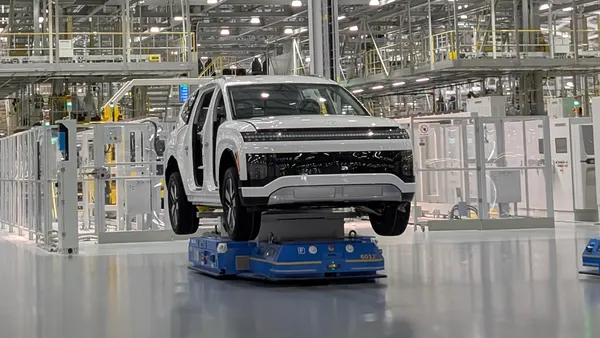Dive Brief:
- Ford Motor Co. has recalled 850K vehicles for low-pressure fuel delivery module (FDM) failures that have led to engine stalling while driving, according to the National Highway Traffic Safety Administration.
- The recalled models include certain 2021-2023 Bronco, Explorer, Lincoln Aviator, F-250, F-350, F-450 and F-550 Super Duty pickups; 2021-2022 F-150, Mustang and Lincoln Navigator; and 2022 Expedition SUV.
- The automaker currently does not have a remedy available to address the large recall, and is notifying owners of the safety risk in the interim. The letters are expected to be mailed on July 14. Ford will send a second letter once a fix is available.
Dive Insight:
According to the recall report, the problem is due to internal contamination of the FDM’s jet pump, which occurs when the fuel level is low. The report also cites “reduced fuel pump internal clearances that result in an increase of internal friction and sensitivity to vapor lock.”
Drivers of the recalled vehicles may experience poor engine performance, such as rough running or misfiring, as well as reduced power and a check engine light. FDM failures are more likely to occur when the fuel level is low, or in warm weather that increases the temperature of the fuel in the tank, according to the report.
Ford’s Critical Concern Review Group first opened an investigation into failing FDMs in September 2022 after receiving a high number of warranty claims and parts returns related to the fuel delivery system on certain model year 2021-2022 vehicles. According to the NHTSA, the FDMs of the vehicles with warranty claims contained a specific variant of the low-pressure FDM and the unit’s jet pump.
A teardown analysis by Ford investigators found that jet pump orifices on some returned parts were blocked by contamination. However, the source of contamination was not confirmed at the time.
The automaker’s CCRG also reviewed warranty data. The CCRG noted that the rate of fuel pump failures significantly declined after its “supplier implemented several corrective actions from December 2021 through September 2022 to reduce contamination and production variation,” according to the report.
The FDM was sourced from Auburn Hills, Michigan-based Tier 1 supplier Phinia and manufactured at a facility in Mexico.
In July 2023, Ford’s CCRG conducted a second review of warranty data to confirm that Phinia’s corrective actions had successfully resolved the fuel pump contamination problem. Based on the available warranty data Ford had at the time, the company closed its investigation because field data showed a low rate of failures and that these failures “could be progressive in nature,” the recall report states.
However, on July 29, 2024, the NHTSA’s Office of Defects Investigation opened a preliminary evaluation of fuel pump failures after receiving six consumer complaints alleging loss of engine power in 2021 Ford Bronco SUVs. Ford responded to the NHTSA’s inquiry on Sept. 23, 2024.
On April 3, 2025, Ford’s CCRG opened another investigation to update warranty claims, field reports and the number of vehicles associated with the NHTSA’s preliminary evaluation in July 2024. On May 22, the automaker’s CCRG discovered that the number of warranty claims was higher in the summer months and warm-weather states.
Ford also collected connected vehicle data remotely to better understand the cause of a higher number of fuel delivery problems in warmer temperatures. The automaker’s CCRG also looked at fuel tank fill levels and diagnostic trouble codes to determine the root cause.
In early June, Ford’s CCRG reviewed the vehicle production dates for the vehicles involved in warranty claims to determine if the problem was related to changes in the manufacturing process. Investigators discovered that all of the warranty claims were for vehicles produced between July 2021 and July 2022.
On June 9 and 10, Ford Product Development and Ford Supplier Technical Assistance reviewed the supplier’s manufacturing process for the fuel pumps installed in the vehicles. The review found that Phinia had changed the jet pump process to “accommodate an increase in build complexity” beginning in early June 2021, according to the report.
Ford also identified that an unnamed Tier 3 supplier of the FCM’s pumping chamber did not manufacture the part to Phinia’s specifications, resulting in low clearances that led to an increase in internal friction and sensitivity to vapor lock. This discovery led to Ford’s Field Review Committee approving the recall of the 850,000 vehicles on June 30.
An estimated 10% of the recalled vehicles are suspected of having defective FDMs.
As of June 6, Ford has received 1,860 warranty claims from September 2021 through May 2025 related to the fuel pumps. This includes 28 field reports and 57 customer service reports for vehicles produced from July 1, 2021, through July 31, 2022. But the company is not aware of any accidents or injuries.
Although a remedy is currently under development by Ford, the recall report does not indicate when the automaker expects to have one available.
The latest recall is Ford’s 89th of 2025 and its second largest of the year, following a May recall of over 1 million vehicles for faulty backup camera software, according to NHTSA data. It’s the highest number of recalls for a major automaker this year, and is more than the combined total number of recalls of General Motors, Stellantis, Toyota, Honda, Hyundai, Volkswagen and Tesla.
But Ford says it's actively working to improve vehicle quality, especially as its vehicles become more complex with a higher number of functions powered by software.
“Ford has more than doubled its team of safety and technical experts in the past two years and significantly increased testing to failure on critical systems such as powertrains, steering and braking,” Ford spokesperson Mike Levine said in an emailed statement to Automotive Dive.
Ford’s 2025 recalls now exceed the total number from last year and potentially extend to over 5.2 million vehicles.
Although the fuel pump recall is due to a mechanical issue, several of Ford’s larger recalls this year were due to vehicle software errors, including May’s recall of over one million vehicles. But finding and correcting software-related issues remains a high priority for the company, as well as for other automakers, as more vehicles are launched with software-powered systems that can be updated over the air.
"The increase in recalls reflects our intensive strategy to quickly find and fix any hardware and software issues and go the extra mile to protect customers,” said Levine.












